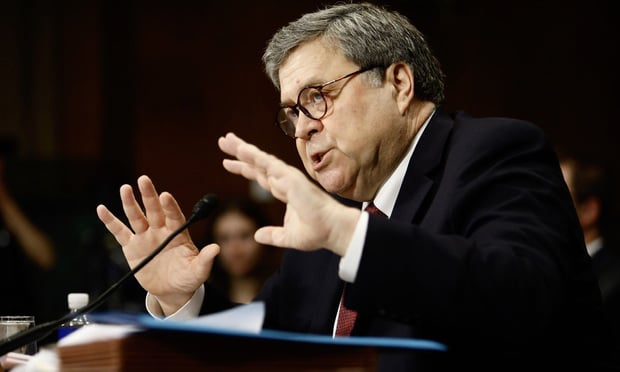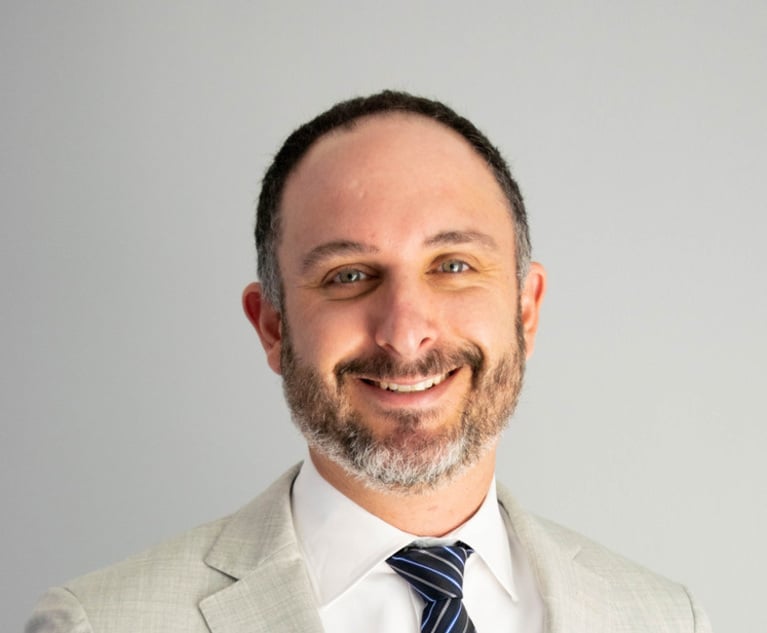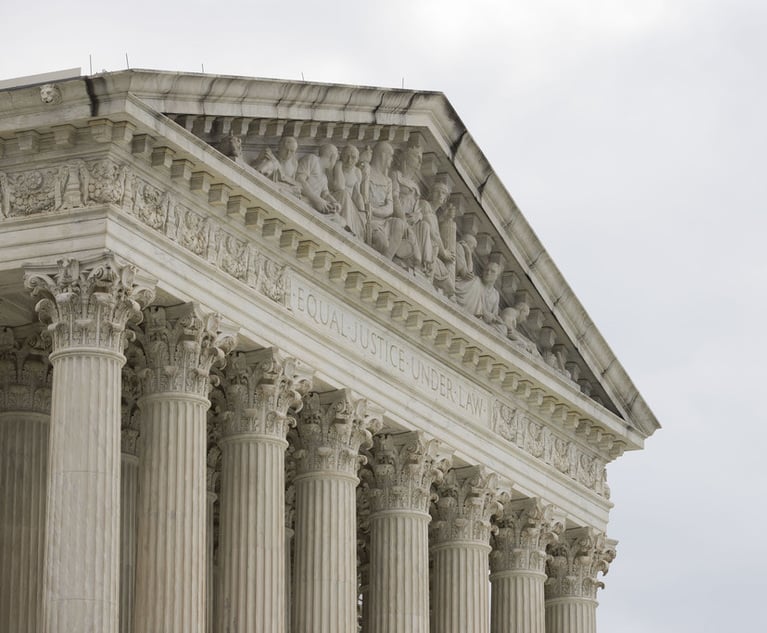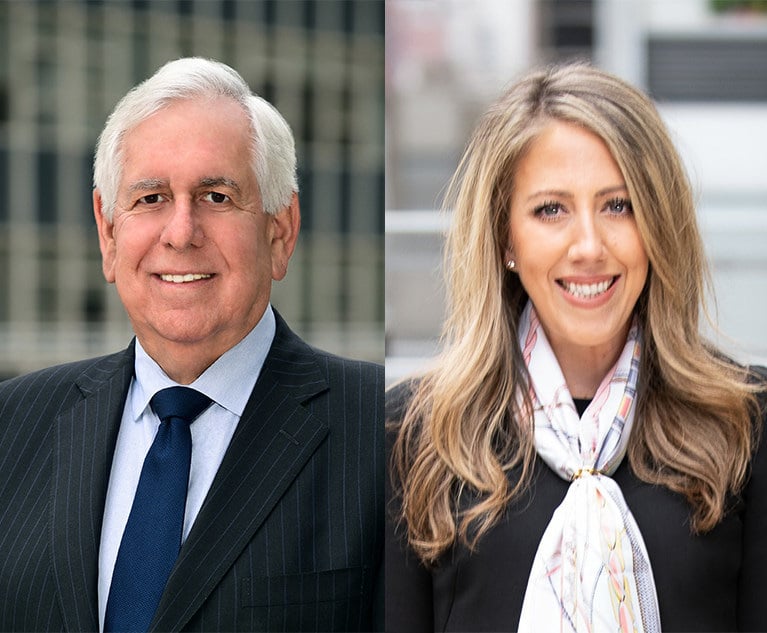Prominent Ex-Prosecutors From NY Sign Letter With Some 400 Others Saying Mueller Evidence Was Enough for Obstruction Charge
Many of the signatories, crossing Democratic and Republican administrations, hold white-collar posts in Big Law now. "To look at these facts and say that a prosecutor could not probably sustain a conviction for obstruction of justice ... runs counter to logic and our experience," the ex-prosecutors said in their statement.
May 06, 2019 at 02:49 PM
5 minute read
The original version of this story was published on National Law Journal
 U.S. Justice Department headquarters in Washington, D.C. Photo: Diego M. Radzinschi/ALM Media
U.S. Justice Department headquarters in Washington, D.C. Photo: Diego M. Radzinschi/ALM Media
More than 400 former federal prosecutors across Republican and Democratic administrations issued a statement Monday saying President Donald Trump would face an obstruction of justice charge were he not the sitting U.S. president.
Several prominent New York attorneys are among the signatories. Multiple chiefs of the criminal division in the Southern District of New York U.S. Attorney's Office are listed, including Elkan Abramowitz of Morvillo Abramowitz Grand Iason & Anello and Lorin Reisner of Paul Weiss Rifkind Wharton & Garrison. So is Brian Maas of Frankfurt Kurnit Klein & Selz, who was the deputy criminal chief in the Eastern District, and Faith Gay of Selendy & Gay, who was deputy chief of special prosecutions in the same office.
John Martin of Martin & Obermaier, who was the U.S. Attorney for Manhattan from 1980 to 1983 and later served 13 years as a federal judge, also signed the letter.
The former prosecutors, many of whom hold posts in Big Law now as white-collar defenders, argued that Special Counsel Robert Mueller III presented sufficient evidence supporting an obstruction charge against Trump. The statement counters the conclusion by U.S. Attorney General William Barr that the evidence did not support an obstruction charge.
“Each of us believes that the conduct of President Trump described in Special Counsel Robert Mueller's report would, in the case of any other person not covered by the Office of Legal Counsel policy against indicting a sitting president, result in multiple felony charges for obstruction of justice,” the former prosecutors wrote in the letter, posted to the site Medium.
Many of the signatories now hold partner positions at Big Law firms. Other signatories include Robert Weiner of Arnold & Porter, a former associate deputy attorney general; Robin Linsenmayer, of counsel at Orrick, Herrington & Sutcliffe, who was an assistant U.S. attorney in the Southern District of New York; Sean Coffey, a Kramer Levin Naftalis & Frankel partner who was an assistant U.S. attorney in the Southern District of New York; Bradley Harsch, a special counsel at Sullivan & Cromwell and a former public-corruption prosecutor in New Jersey; Geoffrey Graber, a partner at Cohen Milstein Sellers & Toll and a former deputy associate attorney general; and Daniel Shallman, a Covington & Burling partner in Los Angeles and former assistant U.S. attorney.
Mueller did not make a recommendation on obstruction of justice, but his report laid out nearly a dozen instances of alleged obstructive conduct. Mueller's report pointed to a Justice Department policy, crafted by the Office of Legal Counsel, that says the prosecution of a sitting president is out of bounds. Mueller's report did not exonerate Trump, and Mueller said he would state whether Trump had not committed a crime.
Barr and his deputy, Rod Rosenstein, concluded, however, that the evidence Mueller marshaled did not amount to obstruction.
“Our determination was made without regard to, and is not based on, the constitutional considerations that surround the indictment and criminal prosecution of a sitting president,” Barr wrote in a March 24 letter to Congress. Defending the president, Barr later said at a press conference at Main Justice that Trump was “frustrated and angered by a sincere belief that the investigation was undermining his presidency.”
Mueller, according to the former prosecutors, presented evidence that Trump used his authority over others to try to “control and impede” the ongoing investigation of Russia interference in the 2016 election. That evidence included unsuccessfully pressuring then-Attorney General Jeff Sessions to reverse his decision to recuse; and the president's efforts to direct then-White House Counsel Donald McGahn to fire Mueller.
 Attorney General Willam Barr testifies before the Senate Judiciary Committee on the Mueller report May 1. Photo: Diego M. Radzinschi/NLJ
Attorney General Willam Barr testifies before the Senate Judiciary Committee on the Mueller report May 1. Photo: Diego M. Radzinschi/NLJThe former prosecutors said in their statement that “these are not matters of close professional judgment.” Defenses could be raised, the letter said, and “every accused person is presumed innocent and it is always the government's burden to prove its case beyond a reasonable doubt. But, to look at these facts and say that a prosecutor could not probably sustain a conviction for obstruction of justice — the standard set out in Principles of Federal Prosecution — runs counter to logic and our experience.”
Barr is facing pressure from U.S. House Democrats to release a full, unredacted copy of Mueller's report. The House Judiciary Committee is expected to move forward with a contempt vote Wednesday, potentially pushing the dispute to Washington's federal trial court.
Mueller, meanwhile, hasn't spoken about his work on the 448-page report. But a U.S. House Judiciary Committee member said Sunday the committee was trying to arrange a time for Mueller to testify.
Jack Newsham contributed to this story.
Read more:
Conservative Big Law Veterans Raise Specter of Trump Impeachment
Mueller's Restraint, Barr's Press Conference: Here's What Lawyers Are Saying
'Stormy Weather Lies Ahead': What Lawyers Say About Barr's Obstruction Call
Don McGahn Said Trump Was 'Testing His Mettle' Over Possibly Firing Mueller
'We Must Speak Out': Hundreds of Lawyers Form New Group Assailing Trump
New Conservative Lawyers' Group 'Checks and Balances' Bristles at Trump
This content has been archived. It is available through our partners, LexisNexis® and Bloomberg Law.
To view this content, please continue to their sites.
Not a Lexis Subscriber?
Subscribe Now
Not a Bloomberg Law Subscriber?
Subscribe Now
NOT FOR REPRINT
© 2025 ALM Global, LLC, All Rights Reserved. Request academic re-use from www.copyright.com. All other uses, submit a request to [email protected]. For more information visit Asset & Logo Licensing.
You Might Like
View All
For Safer Traffic Stops, Replace Paper Documents With ‘Contactless’ Tech
4 minute read
Impact of New NYS Workers’ Compensation Work-Related Stress Relief on Discrimination Claims

Justices Will Weigh Constitutionality of Law Allowing Terror Victims to Sue PLO

Are New York City Housing Providers Ready for the Fair Chance for Housing Act?
10 minute readTrending Stories
- 1'It's Not Going to Be Pretty': PayPal, Capital One Face Novel Class Actions Over 'Poaching' Commissions Owed Influencers
- 211th Circuit Rejects Trump's Emergency Request as DOJ Prepares to Release Special Counsel's Final Report
- 3Supreme Court Takes Up Challenge to ACA Task Force
- 4'Tragedy of Unspeakable Proportions:' Could Edison, DWP, Face Lawsuits Over LA Wildfires?
- 5Meta Pulls Plug on DEI Programs
Who Got The Work
Michael G. Bongiorno, Andrew Scott Dulberg and Elizabeth E. Driscoll from Wilmer Cutler Pickering Hale and Dorr have stepped in to represent Symbotic Inc., an A.I.-enabled technology platform that focuses on increasing supply chain efficiency, and other defendants in a pending shareholder derivative lawsuit. The case, filed Oct. 2 in Massachusetts District Court by the Brown Law Firm on behalf of Stephen Austen, accuses certain officers and directors of misleading investors in regard to Symbotic's potential for margin growth by failing to disclose that the company was not equipped to timely deploy its systems or manage expenses through project delays. The case, assigned to U.S. District Judge Nathaniel M. Gorton, is 1:24-cv-12522, Austen v. Cohen et al.
Who Got The Work
Edmund Polubinski and Marie Killmond of Davis Polk & Wardwell have entered appearances for data platform software development company MongoDB and other defendants in a pending shareholder derivative lawsuit. The action, filed Oct. 7 in New York Southern District Court by the Brown Law Firm, accuses the company's directors and/or officers of falsely expressing confidence in the company’s restructuring of its sales incentive plan and downplaying the severity of decreases in its upfront commitments. The case is 1:24-cv-07594, Roy v. Ittycheria et al.
Who Got The Work
Amy O. Bruchs and Kurt F. Ellison of Michael Best & Friedrich have entered appearances for Epic Systems Corp. in a pending employment discrimination lawsuit. The suit was filed Sept. 7 in Wisconsin Western District Court by Levine Eisberner LLC and Siri & Glimstad on behalf of a project manager who claims that he was wrongfully terminated after applying for a religious exemption to the defendant's COVID-19 vaccine mandate. The case, assigned to U.S. Magistrate Judge Anita Marie Boor, is 3:24-cv-00630, Secker, Nathan v. Epic Systems Corporation.
Who Got The Work
David X. Sullivan, Thomas J. Finn and Gregory A. Hall from McCarter & English have entered appearances for Sunrun Installation Services in a pending civil rights lawsuit. The complaint was filed Sept. 4 in Connecticut District Court by attorney Robert M. Berke on behalf of former employee George Edward Steins, who was arrested and charged with employing an unregistered home improvement salesperson. The complaint alleges that had Sunrun informed the Connecticut Department of Consumer Protection that the plaintiff's employment had ended in 2017 and that he no longer held Sunrun's home improvement contractor license, he would not have been hit with charges, which were dismissed in May 2024. The case, assigned to U.S. District Judge Jeffrey A. Meyer, is 3:24-cv-01423, Steins v. Sunrun, Inc. et al.
Who Got The Work
Greenberg Traurig shareholder Joshua L. Raskin has entered an appearance for boohoo.com UK Ltd. in a pending patent infringement lawsuit. The suit, filed Sept. 3 in Texas Eastern District Court by Rozier Hardt McDonough on behalf of Alto Dynamics, asserts five patents related to an online shopping platform. The case, assigned to U.S. District Judge Rodney Gilstrap, is 2:24-cv-00719, Alto Dynamics, LLC v. boohoo.com UK Limited.
Featured Firms
Law Offices of Gary Martin Hays & Associates, P.C.
(470) 294-1674
Law Offices of Mark E. Salomone
(857) 444-6468
Smith & Hassler
(713) 739-1250






